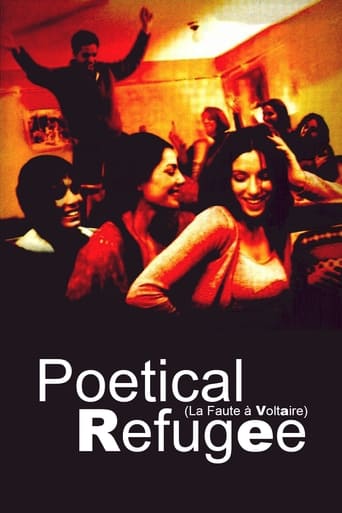stensson
There is a French Film festival running in Stockholm now and the common distributors are to be blamed, not letting us see many of these films before. "La faute à Voltaire" is about a Tunisian immigrant, cheating his way through the French bureaucracy, and a mental hospital, but finding solidarity and real friendship among people living in the poorest conditions of Paris of today.There is a beautiful love story also. The immigrant at the hospital meets a disturbed "nymphomaniac" girl, very well played by Èloudie Bouchez, and starts a somewhat destructive but not altogether destructive relation with her.This is very far from common American and common Swedish film indeed. It is about real people.
rog-15
Really, this wasn´t very impressive at all. The last few years, french filmmakers have produced one socially conscious movie after another , in many different styles but many extremely good films. La Faute à Voltaire, on the other hand, never pays off. The director seems to be confused about what story he wants to tell, and ends up saying nothing at all. Take a look at Nos vies heureuses or the brilliant Resources humaines instead.
louise_maher
This film was very poorly received in it's native country and it's easy to guess why. It highlights many of the less attractive characteristics of the French and their attitudes towards those living on the more uncomfortable edges of their society. Watching the film, it is impossible not to reflect with shame upon any time you have avoided eye contact with a begger or street vendor. Not exactly the sort of feeling you hope to get for your 45 Franc entrance fee. Discomfiting his viewers is not the only way in which Kechiche breaks the rules. The basic film formula is completely abandoned in favour of a realistic story - an almost unprecedented approach to film making. One of the major characters disappears without trace halfway through the film. This sort of thing happens in everyone's life - you break up with your boyfriend and never hear from him again - but filmmaking rules stipulate that such departures should be neatly explained and followed up. It seems Kechiche never learnt the rules, or indeed that he's completely uninterested in making a commercially successful or at least critically acclaimed film. But that's his business - whatever his motives were, I'm glad I stumbled into the cinema when I did, as la Faute a Voltaire, one of the most touching and impressive films I've seen in years, only got ran for a few weeks in Paris cinemas.
screamer-13
How come so few people have seen this film? It is good. Not brilliant, but definitely good, and if I had gone for an epic bathroom break about halfway through the film and returned in time for the end, I would have given it a 10. The theme of the film is the life of North African immigrants living in France, and its main protagonist is Jallel (Sami Bouajila), a young Tunisian man who has entered France as a stowaway and manages to blag his way to a temporary visa by telling customs he is a political refugee from Algeria. Jallel is a sympathetic and kind-hearted person, an all-round nice guy and a very good main character for the film. We follow him as he tries to find work and stay alive in a society which largely rejects him because he is an illegal immigrant with no papers. He manages to find friends and shelter amongst the immigrant community of Paris, and once he has a steady source of income, illegally selling fruit in the subway, he proceeds to embark on a rollercoaster ride of emotion with some of the women he meets in his little world. The first half of the film is upbeat and a joy to watch. Then there is a huge turning point about halfway through, after which the film becomes rather stale and boring. This is partly due to Elodie Bouchez's performance as a needy and stress-inducing young girl who is a few sandwiches short of a picnic. This is undoubtably an amazing, award-worthy performance, but this film really does not benefit from it. In an instant we are thrown from a relaxed, happy state, into a headachey pit of despair. This is when it's worthwhile taking the aforementioned bathroom break. However, things get much better in the last half-hour, when Bouchez's character becomes happier and more involved with those around her, and we get another joyful song and dance routine. The very end of the film is a bit sad, as we look back on Jallel's time in France and can't help feeling for him - he was such a nice guy, and deserved a better life, but the only mistakes he made were being kind, caring, and supportive of his friends. Despite the boring/painful spell in the third quarter, the film is very good and well worth watching. The French might be quite hard to keep up with if you are not fluent in the language, but that's what subtitles are for.


